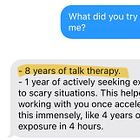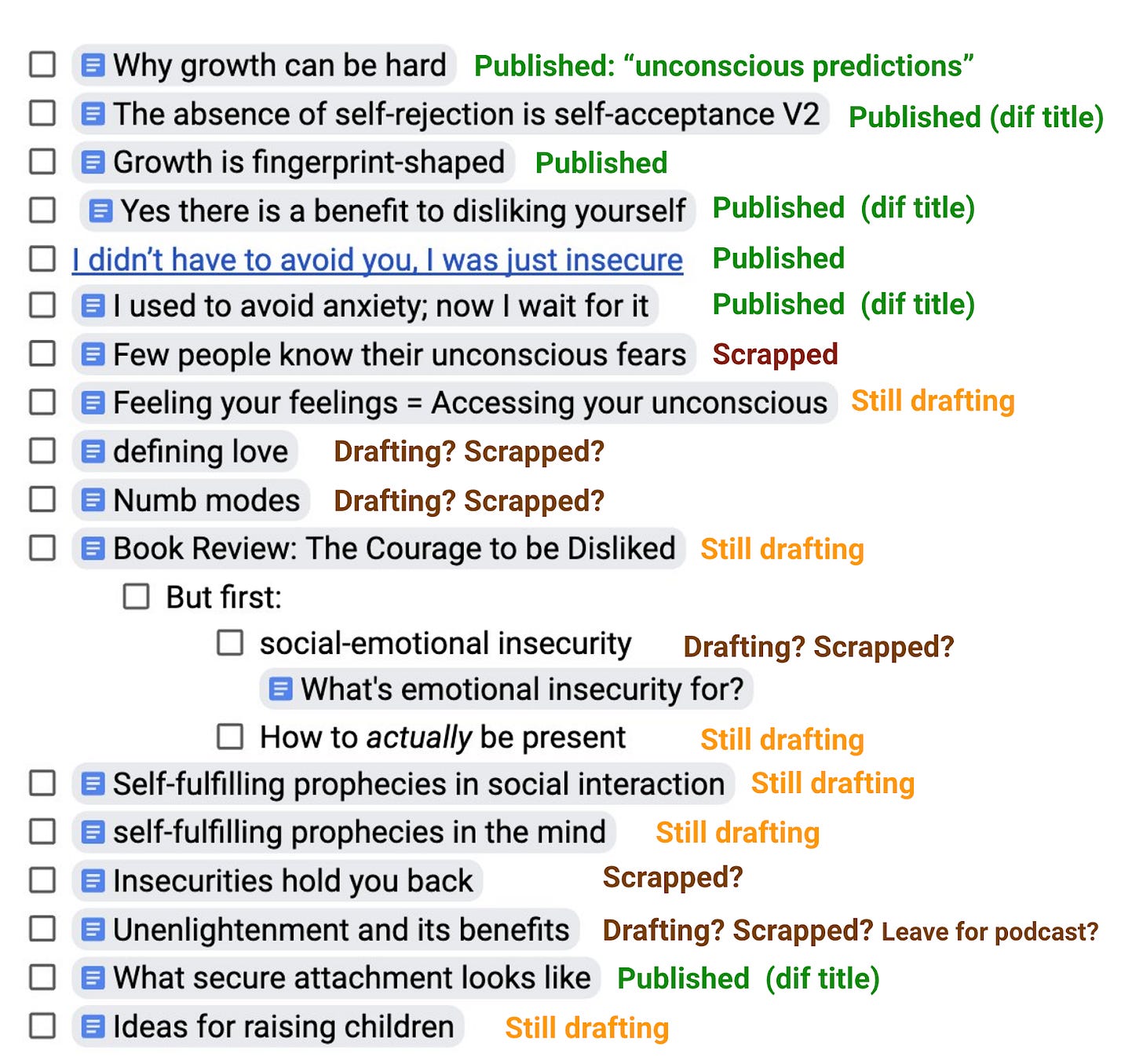I don’t make this obvious, but most of my blog posts are actually living creatures. They get improved constantly:
Significantly revised “How I get unconscious predictions to update” section. (This post also updated — same content, different focus.)
Originally titled “I became a bounty hunter”, I added more context and clarified the focus.
Apparently there was stuff in this post that was just… wrong? Stuff I used to do, but definitely had stopped doing by the time I wrote that post. Weird. Fixed that.
Phrasing improved substantially.
Also, if you look closely you’ll see that almost all of the posts linked within this post were published *after* this post was published. This is one of the most common edits I do: Whenever I post a new post, I edit many of my old posts to link to it.
Ditto.
Simplified!
Simplified and revised!
Changed focus to “Eye contact is effortless without emotional blocks” (before: ~”I hosted a cool party”, lol). Removed unnecessary details.
Revised substantially.
“Why don’t you just hold the post longer and spend more time editing it before posting it?”
I do lol.
Almost all of the posts above took more than 20 hours, across at least a few months. One took 80+ hours and still got heavily revised.
It takes a lot of work to write short posts I like!
At the extreme, the post below took ~300 hours over the course of a year:
(That’s about 12 minutes per word.)
(And that’s omitting another ~100 hours of others’ help editing.)
I love how this is story is written though so I’ve barely edited it after posting.
Is spending that much time writing worth it?
Well, I do it anyway. It has some benefits:
It’s fun
I get to clarify my thinking
Sometimes readers reach out to me
I have 25k high quality words that make language models more useful to me
…But also, notice that I didn’t say “it helps others”:
What is my writing for?
You might expect that by writing posts about growth, I’m trying to help people who read my posts grow, but no, I think that’s mostly not possible.
In general, I expect it to be pretty unlikely that someone reads a post of mine and understands it as I intended. I’ve tried this: I ask someone to read a post, and I ask them to explain what they understood. Most times they almost entirely miss the main point of what I was trying to say, or get it straight-up backwards.
But that’s okay! My writing is for me, and I just so happen to post it publicly. By writing, I’m clarifying my thoughts. By writing, I get to have a document with all of my ideas and send it around to people to help me “edit” the post— i.e.: clarify my ideas and get better at saying what I’m trying to say in person.
It would certainly be nice if other people understood what I was trying to say, but I haven’t figured it out.
Aside: Maybe conceptual writing is impossible?
In general, it might be the case that having people you don’t know understand your conceptual writing is ~impossible.
For example, I have a post explaining how mental issues are often immediately useful. I’ve seen people read this post (or at least earlier versions of this post) and think, “Oh he’s talking about trauma. Mental issues that were useful at some point in the past, and then they just stuck around and now they cause issues.”
The trouble is… that’s what I wrote the post to disprove. And many readers STILL fail to get it. (You can even see this in one of the comments!)
I don’t know why this happens. Maybe it’s that I’m bad at explaining things?
But also, I’m not sure any writers have figured it out. I can barely read anything conceptual that anyone writes and really get it. For example, I had to read The Courage to be Disliked seven times over two years to really get it, and it nominally seems written in a way that’s easy to digest. But even though I read the book seven times, I’m not sure the book taught me much — I think instead it just showed me where to place my attention and what questions to ask such that I (eventually) derived an equivalent philosophy of my own.
Communication is hard! Maybe conceptual writing is impossible in general.
Why would this be? Maybe because improving one’s thinking is mostly unlearning (as opposed to learning). And the trouble with that is unlearning one’s specific misconceptions is a highly individual process. Everyone has different misconceptions that they need to unlearn, and a blog post can’t address them all.
(But there I go again trying to explain things again ↑. Will anyone correctly understand what I’m trying to say? Who knows!)
This is all also part of why I rarely read books anymore: Reading almost never causes me to deeply understand the ideas written about. Instead, I either try to re-derive the thoughts myself (like I did with The Courage to be Disliked), talk to experts/mentors directly, or use AI (see below).
I don’t know of any conceptual writing that solves this issue. Do you? (One thought though is maybe I should max on Socratic questioning. Maybe that could work.)
With all of that said, I don’t think that story writing has this problem. Somehow people understand stories much better. (Myths are pretty lindy!) (Stories seem to have more context somehow?) This is also part of why I’ve somewhat pivoted to writing more stories on this blog.
How AI is changing reading and writing for me.
Reading
Instead of reading (especially books), sometimes I throw the text into a language model and ask it questions. Sometimes I also give it all of the writing on my blog and ask it how it compares to my thinking.
Also, I suspect that in the near future reading books will somewhat lose favor to talking to an AI well-versed in the topic. In most cases I think I would rather talk (with my voice!) to an AI that represents a book/author/idea, rather than passively listen to the audiobook. (Has anyone done this yet?)
Writing
Writing stories could get much quicker? This recent post was actually mostly compiled by AI:
It took something like 1.5 hours of prompting for the first draft + ~5 hours of post-editing, which is pretty good!
How I did it: I gave Claude 3.5.0 Sonnet an old journal entry, my intentions, all of my posts in the last year, and a custom prompt I had already developed. It produced nearly what I later published.
That said, I have been trying to use language models for writing for a while and this was the first significant success, so maybe I just got lucky. Previously, I tried to use language models for writing conceptual posts and it just hasn’t worked. For example, I can import the 25k words of context from my blog without mentioning trauma, and it will immediately start explaining psychology using trauma. I guess it’s just reverting to the mean of the training data.
I’m probably going to spend less time writing going forward though
Somewhat because I’m realizing that conceptual writing is ~impossible.
Somewhat because I may shift to explaining my ideas in podcasts rather than in writing.
But largely because my counterfactual use of time has gotten quite wacky lately. In the time I could write one (1) blog post, I can potentially cure someone of lifelong anxiety. Uhhhh
So maybe I’ll write more stories, record more podcasts, and write fewer conceptual posts.
Posts I would like to write soon
That said, here are some (just some) of the posts I would like to finish soon:
I run unhinged social events — why?
Insecurities, and how to (actually) become secure
Secure people don’t get stuck in relationships
Locally optimal problems
Camille’s growth in the year after we spoke
Becoming more present
Self-fulfilling prophecies in sex, social interaction, and life (Pt. 1)
Did pre-contact societies have modern parenting problems?
Experiments in retroactive funding
Book Review: The Courage to be Disliked
Adlerian Psychology, a guide to multi-scale agency?
A post about mental red teaming / stress testing
How I Will Meet My Wife: A Self-Fulfilling Prophecy
“Feelings” are code for “unconscious”
Unconscious blocking
Depression is often the internal state that corresponds to the external strategy of interacting with the world less.
You will feel as you want only if you find and update all of your unconscious predictions in opposition.
Make events AWKWARD again: Advice for running events
Why you avoid people who are insecure
Lol.
But who knows how long that’ll take. For reference, here’s the W/L of my “main drafts” from almost 3 months ago:
That’s all for now!
Best,
Chris


















Fully agreed, I think Gwern’s model of “living pages” is much more optimal than the “write and forget” mode that’s the default. I wish Substack had better support for this, ideally with some sort of way of highlighting what’s changed since your last visit to the page.
> “Feelings” are code for “unconscious”
This one sounds the most interesting!